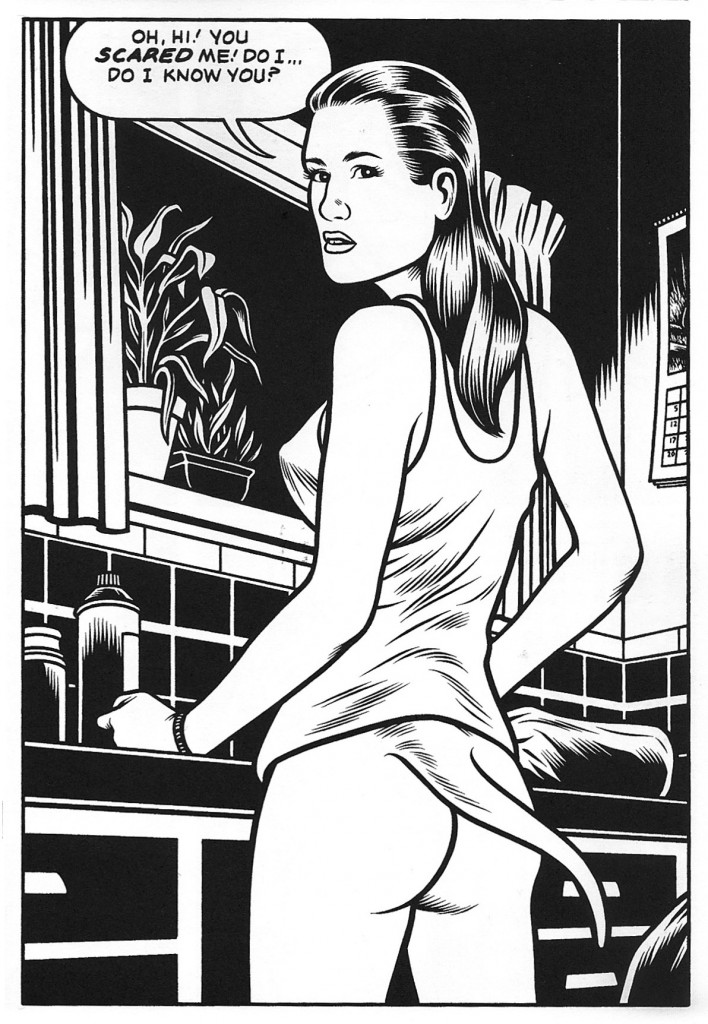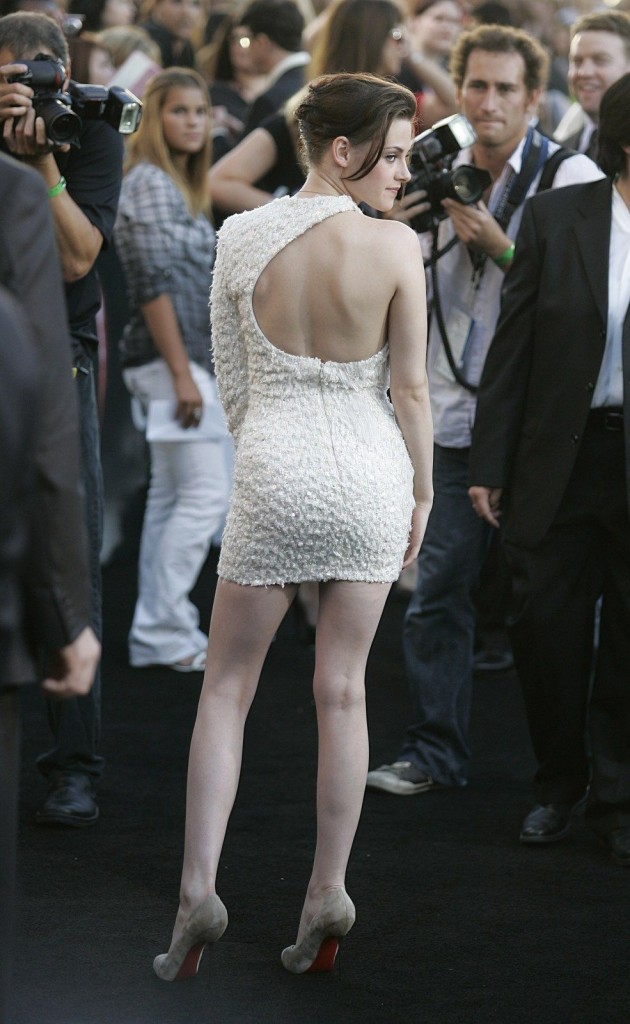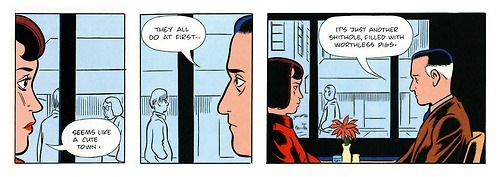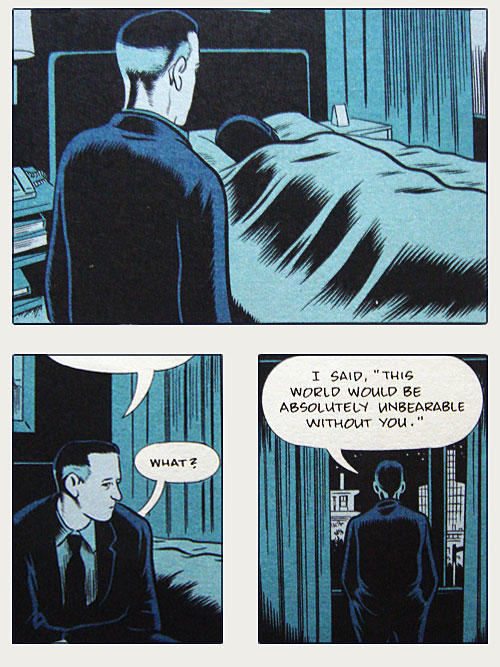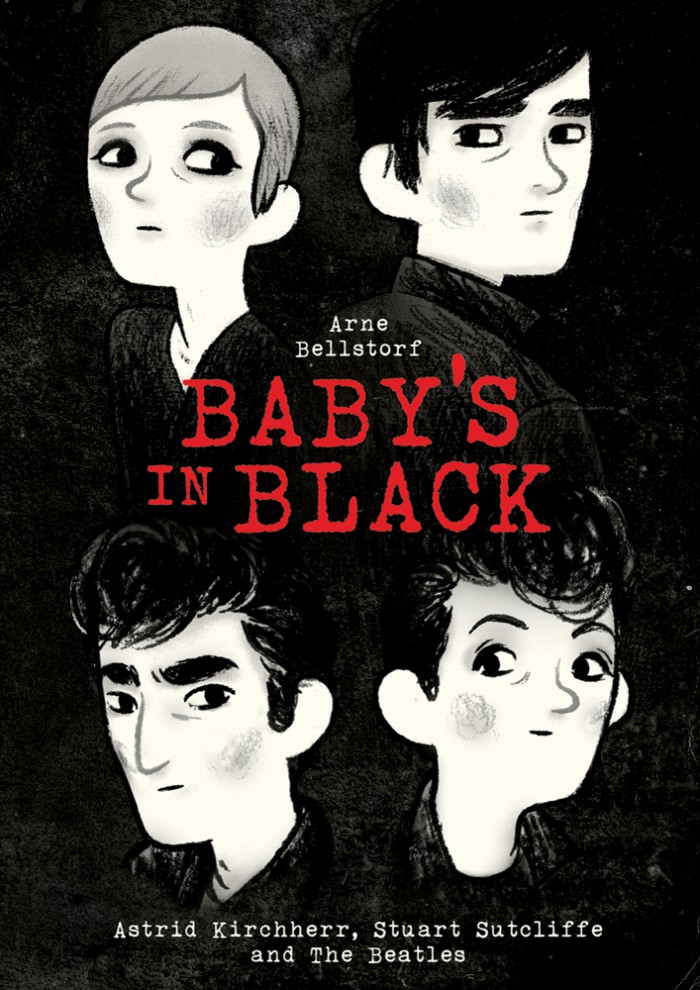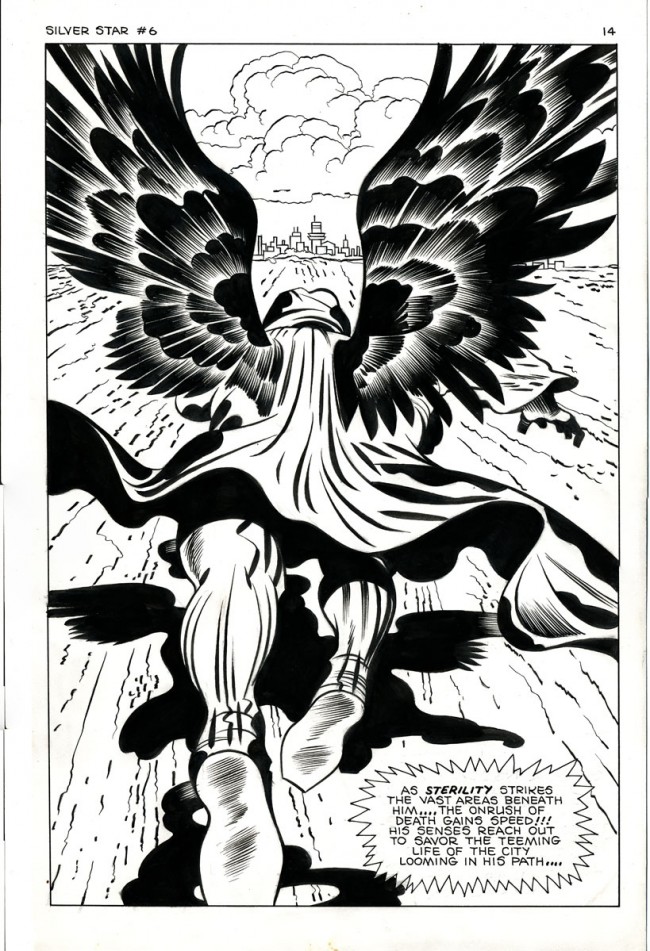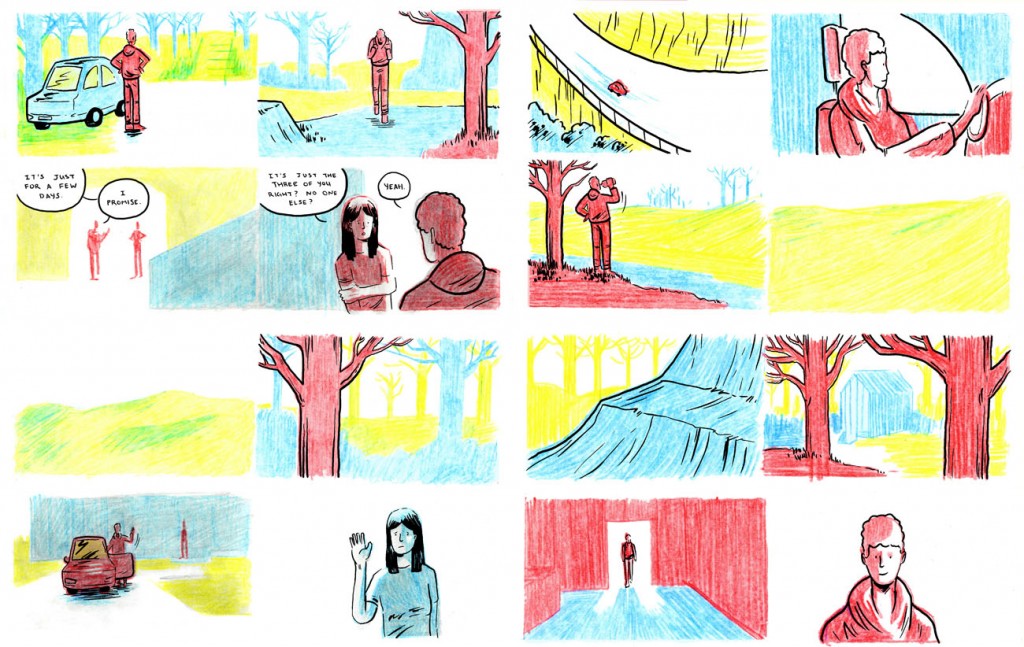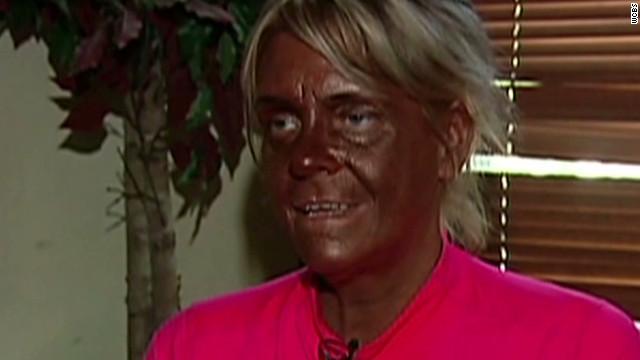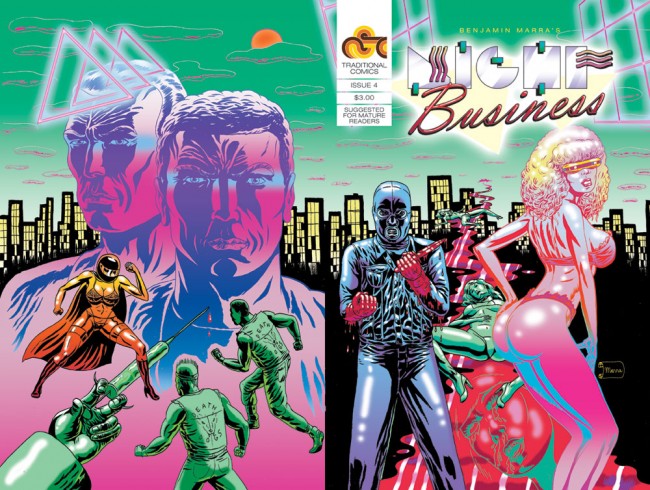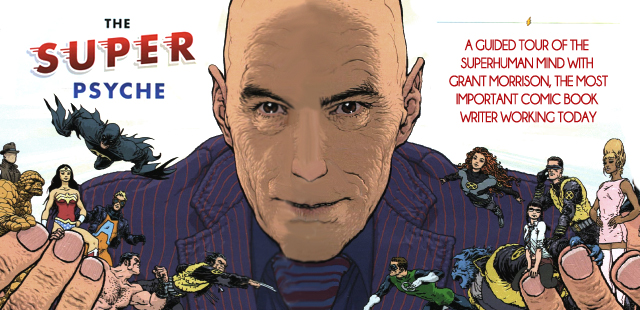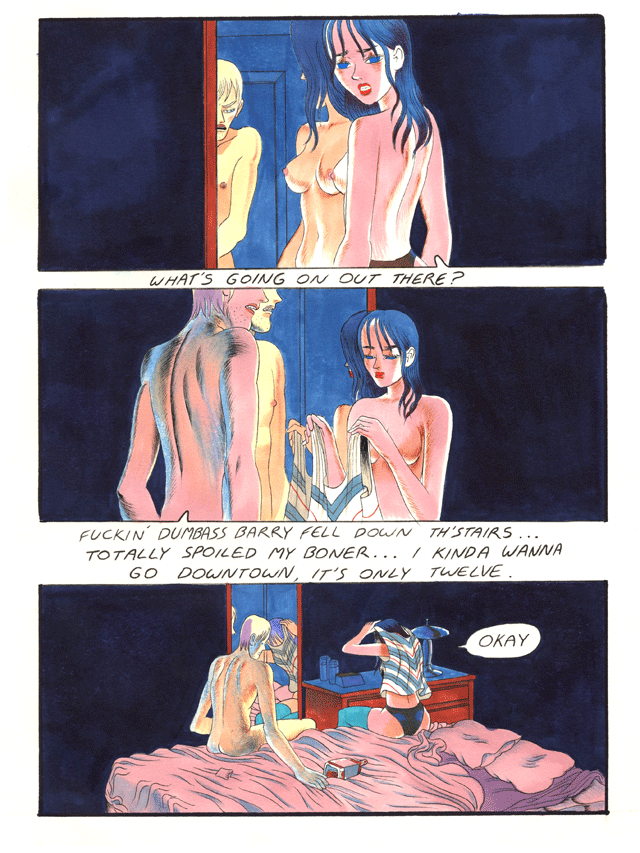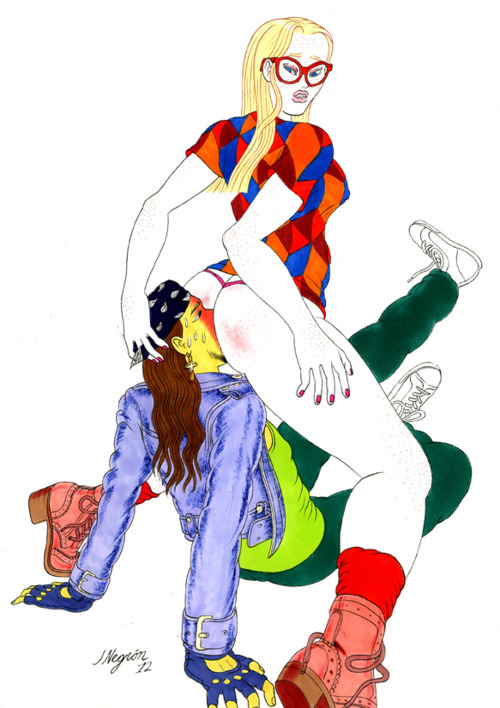Archive for May 15, 2012
BREAKING: KRISTEN STEWART LOVES BLACK HOLE BY CHARLES BURNS
May 15, 2012Drifting over to the graphic novel section, Stewart gasps at seeing Black Hole. “This fucking store is like kismet!” she says. “I want to do this movie!” The book, about a sexually transmitted plague, “is disgusting, so gross,” Stewart enthuses. “I love the first image” – she turns to a completely black page with a white vagina-shape opening in the center – “a slit. You just grow, like, holes in your body. The imagery is so weird. See” – she flips to another page – “he’s looking at her hand and soon there’s gonna be a little mouth in there. It’s so sexual, the desire is so fucking palpable, but it feels so dirty, like [the characters] are so ashamed because they’re diseased, they’re literally getting these holes.”
—Kristen Stewart, Elle, June 2012
NOT MAD AT THIS AT ALL
Mad Men thoughts, Season Five, Episode Nine: “Dark Shadows”
May 15, 2012* Ah, so this is what a non-tour-de-force episode of Mad Men looks like. I’d almost forgotten!
* Due to the domino effect of no longer having advance screeners for Game of Thrones, I didn’t get to watch this episode until last night. Though I deserve an honorary degree from a prestigious university for my achievements in dodging Mad Men spoilers on Twitter all day long, I still managed to gather that this episode’s q-rating was lower than normal among critics. You probably don’t need to look any further than the presence of the woman in the second shot of the ep to figure out why, but beyond reflexive Bettyhate, I really do think there was simply a bit of a comedown from the astonishing “Mystery Date”/”Signal 30″/”Far Away Places”/”At the Codfish Ball”/”Lady Lazarus” run. “Dark Shadows” didn’t have a setpiece or a grand unifying theme or a psychedelic ’60s touchstone or a particularly impressive visual palette or even (despite the title, despite Betty’s shocking act of vengeance) the ominpresent sense that something awful is going to happen — it was just an hour of good television involving complicated characters, centered largely on one who most viewers dislike. But we’d be blessed if this were the baseline of quality for this or any other show.
* The Rise of Ginsberg. To swipe a line from his namesake, the best mind of his generation. To swipe a line from Rizzo, read the rest of the poem, you boob.
* I was so entertained by Bert Cooper’s brief return to the spotlight — checking his watch to measure the length of Roger and Jane’s marriage was a particularly lulzy moment — that I didn’t even notice how much I miss him as an eminence grise. He’s mostly a figure of fun for the SDCP gang, now. I mean, he always was, but he was also gnomic and intimidating. Now he’s the guy who says “don’t start the meeting without me” after the meeting has already ended, the guy who quits the company in disgust one season but is back the next like everything he’d done and said was meaningless.
* I miss Betty, too. Yeah, big Betty fan here. I have no desire to wedge my feelings about her against those of everyone who dislikes her so much, because then I’m never really sure what it is I’m actually responding to, the character or the conversation. But, it seems to me like including one character who doesn’t grow, who doesn’t change, who if anything seems to get more childishly vindictive and unhappy no matter what her status quo is, is not a lapse but a contrast.
* And she was given the episode’s emotionally strongest material. I can hardly imagine how devastating it must have been to see that her distant, damage-causing husband was writing beautiful little love notes to his new wife over nothing at all, over going to the store to buy lightbulbs. Like, I gasped, went “woof” out loud for her. Then I did it again when she revealed the existence of Anna Draper to Sally, a crazily impulsive and dangerous and mean and traumatizing thing for her to do. What the fuck, Betty? Then there’s the dynamic of her at Weight Watchers: when things go bad, she loses. Then when things go bad, she doesn’t. Let me tell you something, you don’t have to have a recovered anorexic wife to learn what a terrible idea it is to tie your eating and your body directly to negative circumstances…but it helps! She got the best physical beats, too: Crumpling up Bobby’s drawing and throwing it at the garbage can but not even getting it in, chugging the Cool Whip then spitting it out, slamming things when she realizes her plan to drive a wedge between Sally, Don, and Megan failed. And she got that wonderful line, “I’m thankful that I have everything I want, and no one else has anything better.” I have a hard time understanding how you could be bored or impatient or dissatisfied with the Betty material, to be honest. It’s razor sharp.
* Haha, looks like Betty didn’t need Don and Megan’s tag-team Cool Whip pitch at all! Just taste it, indeed.
* “Why a pig?” “I don’t know, but everyone laughed.” Rizzo and Ginsberg reveal the essence of art.
* Great dynamics in that scene that introduces Don and Ginsberg’s competing pitches for Snowball, too. Rizzo brown-nosing, Ginsberg passive-aggressing, Don coming on just a little too strong (“There’s a 95% chance you’re thinking ‘snowball in hell’”), Peggy reacting to three guys with whom she’s intensely competitive but whom she also appears to like. When I think of Mad Men as a rich show, this is what I’m talking about.
* So many wonderfully revealing, fleeting facial expressions in this episode. Don rolling his eyes at himself for coming up with “sinfully delicious.” Betty flashing a “hey, wait a minute” look in the eyes when her Weight Watchers counselor refers to “skinny people” as a group that doesn’t include her. Jane lighting up when Roger offers to be her sugar daddy again. Peggy’s gleeful smirk when Ginsberg loses to Don — angry take-no-prisoners Peggy is the best Peggy. Roger’s sad-sack mien when he apologizes to Jane for “ruining” her new apartment, someone who’s play-acting at being sad in hopes he’ll actually feel it. Maybe he could take crying lessons from Megan?
* “So, you suddenly have no problem telling people I’m Jewish?” Is Jane talking to Matthew Weiner?
* This week in Ominous Orange: Betty’s stranger-in-a-strange-land comportment as she enters Orangeworld, i.e. the nu-Drapers’ apartment. The red-headed Dark Shadows auditioner skewering Megan as a one-percenter, then bringing up the coming Thanksgiving holiday so portentously it was like she was talking about Megan’s coming execution. And best of all, the GIGANTIC empty orange couch in Pete Campbell’s office when Beth pays her sexy visit, subsequently revealed to be the location for his sensual daydream to treasure forever.
* Speaking of: jeeeeeeeez, Alexis Bledel. I didn’t even mind her digitally removed nipple. Well, okay, I did, but not much.
* Every line in the Roger/Ginsberg meeting was a fucking scream:
“…and murder.” “…You’re not coming to dinner.”
“Normal people. You know what I mean. People like me.”
“It has to be cheap—” “Surprise.”
“Bring me your best by sundown Friday. (I have done a little research.)”
Yeah, there basically came a point in that scene when I just started transcribing it. I wish I’d had the presence of mind to get the initial stuff about Roger wink-wink-nudge-nudging about his LSD experience, too.
* “The thrill of having poisoned us from 50 miles away.” Megan had the right of it and Don knows it. They both apologize to each other, and they both mean it. Love this couple.
* Gene Draper is ADORABLE in his footie pajamas!
* Don’s done pathetic things in his personal life from time to time, and from very early on — think of his panicked attempt to ditch everyone and escape with Rachel Mencken in the first season. But spiking Ginsberg’s superior idea for Snowball is the first professionally pathetic thing we’ve seen him do. His confrontations with Pete, Duck, Hilton, Ted Chaough, and the loss of Lucky Strike all made him look stronger and smarter. This makes him look weak and defensive.
* If you…are thinking…of opening…the balcony doors…DON’T!
Made Mine Marvel
May 14, 2012Last week I saw The Avengers and its immediate Marvel-movie predecessors, Thor and Captain America: The First Avenger. (And just for reference: Iron Man, The Incredible Hulk, Iron Man 2.) Here’s the most important part of the following review of these three films: I gave three times as much to The Hero Initiative upon viewing them I did to Marvel and its business partners. Yes, this means that I gave Marvel and its business partners a non-zero amount of money to see these movies, more than they gave the family of Avengers/Iron Man/Hulk/Nick Fury/Captain America/Thor co-creator Jack Kirby (who despite what you may have heard did receive a brief on-screen credit, for what it’s worth) for making these movies possible. That’s deeply unfortunate and deplorable and wrong, and as both an occasional freelancer for the company and a fan of any number of its comics and creators, I encourage Marvel to change its tune on this matter, just as I encourage those of you who pay money to watch these movies to give an equal or greater amount to The Hero Initiative to help take care of creators who are in need because the companies they built never did so themselves. Indeed the bad taste in my mouth would have kept me from going to the movies to see Avengers at all but for the intervention of, literally, my three oldest friends, who were in town and wished to recreate our summer-blockbuster theater trips of old. When life gives you $4 concession-stand sodas, you make lemonade, I suppose.
First, I watched Thor. It was bad, pretty much. I mean, it had its moments, largely via the fantastic casting of its two leads, Chris Hemsworth and Tom Hiddleston as Thor and Loki. Think of what an unwatchable turd this would have been if those two had been less committed and gleeful about their ridiculous shouty roles! Space Éomer and Cosmic Wormtongue were a real coup, especially given how important Hiddleston’s Loki ended up being for The Avengers. A tip of the hat to Kat Dennings as well for her turn as the kind of sarcastic, kind of dopey friend/assistant. In a film as flatly functional as this one was, any part that that isn’t strictly required to advance the narrative should be celebrated, and Dennings made the most of it, especially when required to embody the female gaze while Thor walked around with his shirt off. For real, the presentation of male superheroes as eye candy for the female audience in both this and Captain America is a funny, smart, sexy, and welcome development — imagine if the comics had the stones to do something like that!
So yeah, that was good. So was the reasonable gravitas projected by Stellan Skarsgaard and Idris Elba in their supporting roles as a scientist and the most interesting Asgardian — y’know, they got the job done. And the big epic visuals were surprisingly effective as well. It wasn’t Kirby, of course, nothing but Kirby himself is, but I thought the golden architecture of Asgard was suitably grand and smartly designed; the Bifrost’s spherical teleportation mechanism was a memorable bit of business, for example. Meanwhile, the closest the film got to saying something really unexpected and smart was its frequent use of awe-inspiring rainbow-colored shots of the distant stars and galaxies, implying that the reality of our universe is at least as amazing and unknowable and impressive as anything a science-fantasy can conjure up.
The rest of it, of course, was the purest anonymous hackwork from Kenneth Branagh. I’m really hesitant to ever use the h-word simply because I’m not a mindreader and don’t presume to know whether an artist really was just banging something out for cash, but in Branagh’s case we have enough of a track record on other projects involving adaptation and interpretation to see how rote this Lord of the Rings knockoff really is. Dull would-be sweeping opening narration. Vast armies of undifferentiated CGI baddies. A band of warriors distinguished solely by their hair. Purple clichés like “You’ve come a long way to die, Asgardian” and “Allfather, we must speak with you urgently” dropping like bricks from the mouths of flimsy supporting actors, as if someone had taken the “give up the halfling, she-elf” line from the Jackson/Walsh/Boyens Fellowship of the Ring adaptation and made an entire screenplay out of it…gah, what a tedious and derivative mess.
Just as disappointingly, Branagh displays no proficiency whatsoever for directing action, and that really could not be more crucial to making a good superhero movie. The frost-giant fights were murky and lazy, just a bunch of people swinging things around and knocking things over. Worse still was Thor’s break-in to the SHIELD compound, in which what could have been a Bourne-style tour de force of ruthlessly efficient takedowns became a supporting-card match-up between pro-wrestling jobbers who don’t know how to sell. You got that one big wish-fulfillment moment when Thor got his powers back and took the fight to the Destroyer, where you’re like “Yesss, that’s what it’d be like to wield the hammer of the gods, Robert Plant was totally right,” but that was about it. No, wait, there was the scene where he beat up a hospital room full of doctors and nurses, but the success of that sequence had more to do with how odd it was to see something like that in a hero’s-journey-by-the-numbers flick like this than for particularly memorable ways in which to coldcock phlebotomists.
The key non-Hemsworth/Hiddleston performances were pretty brutal to watch, too. Anthony Hopkins eats so much scenery that I suspect the Odinsleep is actually a diabetic coma. Natalie Portman as the love interest is just horrible, like her insufferable Garden State character got an astrophysics doctorate. She’s one of the most beautiful human beings on God’s gray earth, yes, but has she ever been good in anything not Closer or the SNL thing where she cursed a lot?And that’s when you start paying attention to the plot and realizing how flimsy that is, too, even beneath the actual good performances. For example, both Portman’s Jane Foster and Hiddleston’s Loki undergo 180-degree reversals of their entire lives up inside, what, 48 hours? The brilliant astrophysicist takes the word of a person she has no reason to believe isn’t mentally ill, because he’s hot and SHIELD is mean? Everything here happens because it must, because that’s the kind of movie this is. Take away Hemsworth and Hiddleston’s joie de vivre and you’ve got Marvel’s 2nd-quarter financial report, not a movie.
(I will say this for it, though: Making Thor’s opposition to genocide the hinge on which the climax swings is a very interesting, and frankly wonderful, idea. Given that writer Geoff Johns just used the commission of genocide as a way to get his new, younger, tougher version of Aquaman over with the audience of his comic, apparently successfully, you can see that this could very easily have gone the other way. More easily than the way it went, in fact.)
Captain America: The First Avenger, though? This thing was pretty good. It had heart, and it had wit, and it had smarts. First, the heart: a warm, slightly sad performance from Chris Evans (!!!) as Steve Rogers, one that made him feel as much like a man out of time during World War II as he would later in the present day. I understand that the line in which Steve presents his zeal to enter the Army and fight the war not as a hankering to kill Nazis but as a deep-seated dislike bullies of all shapes and sizes, given that he’d been victimized by them his entire life, was a Joss Whedon contribution, so good on Whedon; that cracked open that character and showed me what’s inside in a way that no other interpretation of him, not even Ed Brubaker’s fine ongoing multi-series megastory of the past half-decade or so, has done. (As an aside: Jeez, does this version of Cap reveal Mark Millar’s line from Ultimates, “You think this A on my head stands for FRANCE???”, as the single worst comics line of the decade or what? Shame, shame, shame on me for not seeing it at the time. And for many other things besides, but mostly that, for our present purposes.)
Then the wit. Unlike Thor‘s random, listless swinging of arms and knocking-about of bodies (seriously those fight scenes played like my baby daughter tearing into block towers), Captain America‘s director Joe Johnston made his fight scenes memorable by dint of effort and attention to detail. He figured out like maybe no one ever has before how to make Cap’s nebulous “peak human ability” not-quite-a-power-set work in the context of action: Imagine the coolest, most amazing possible move a person could make, if they were both as skilled and as lucky as they could possibly be, then imagine a guy who can make move after move like that, without fail. If he leaps, he’s going to make it. If he dodges, they’re going to miss. If he shoots or throws or punches or kicks, he’s going to hit the target.
Johnston peppers the action sequences with little flourishes of visual imagination and humor, too: using multiiple countdown clocsk for the destruction of the Hydra lab instead of just one; the Red Skull firing off a dud round with his magic laser, then trying again, then nodding with self-approval when it works this time, like “Ah, there we go”; ending a “he’s got a gun on the kid!” hostage situation by having the bad guy toss the kid into the water, only to discover him treading happily, telling Cap, “Go get him! I can swim!” Even the gunfire, of which there was a surprising amount for a superhero movie, felt concrete and dangerous without being grotesque, in that bloody/not-bloody Indiana Jones way.
Indy, of course, is the film’s lodestone, from the Nazi-relic-hunter maguffin on down. The trick–and this is where the smarts come in–is in flipping the Indiana Jones conventions around in novel and entertaining ways. The film begins with the Nazis successfully acquiring and using the magical artifact rather than being a race to stop this from happening. The places-on-a-map travel montage doesn’t depict Cap’s quest across the globe, but his USO tour. Cap is the good-hearted mensch who recruits affable rogues to help him, not the other way around. And Cap actually gives himself over to the ameliorative, sacrificial oblivion that Indy always seemed required to surrender to, only to save his own bacon at the last moment.
Moreover, a few of Captain America‘s shrewdest moves have multiple purposes. Chris Evans joins Chris Hemsworth on the list of Marvel men whose bodies are presented unambiguously as sex objects, somehow threading the needle between appealing to women without turning off men — four-quadrant success, here we come — but also selling a historically undersold dimension of superhero physicality. (No sculpted-muscle rubber bodysuits required here!) Making Hydra a cult of personality in service of the Red Skull both obviates the need to keep the icky Nazis a key part of this international-audience family blockbuster, but it also provides an explanation as to how its marvelous, anachronistic weaponry never spread outside the narrow conflict between Hydra and Cap’s crew, altering both the war and the course of human history.
Cap also boasts the liveliest supporting cast of the bunch. Like Thor, it could probably have gotten away with its core protagonist-antagonist pairing, the strong performance from Evans and the delightfully cartoonish villainy of Hugo Weaving, who knows from cartoonish villainy. (And dig the voice: Hugo Weaving presents Werner Herzog as the Red Skull! He joins Daniel Day-Lewis as John Huston as Daniel Plainview and Heath Ledger as David Lynch as the Joker in the pantheon of Great Movie Villains Who Sound Like Great Movie Directors.) instead it gave us Tommy Lee Jones’s most effective turn as himself this side of The Fugitive and No Country for Old Men, Hayley Atwell as a believably steely and caring Allied intelligence operative, and lookalikes Sebastian Stan and Dominic Cooper as tough-guy Bucky and swaggering scientist Howard Stark, a pair of alpha males working different angles on that role and quietly setting an example for Steve as to how he does and doesn’t want to behave himself.
I don’t mean to oversell Captain America, mind you. It could just be my decade in the sausage factory souring me on its prospects for capturing the imagination of a generation the way Indiana Jones did for me, but I can’t help but feel it’s not going to be returned to in quite the same way. It almost certainly won’t by me. But it feels like a film, a work of art/entertainment with a unique personality and point of view which one could locate in its director’s overall oeuvre, in a way that Thor simply didn’t. It does more than what is strictly necessary and sufficient, and that can be a lot.
Which brings us to the crown jewel in the Marvel Studios “cinematic universe,” Joss Whedon’s Marvel’s The Avengers. Two of my favorite elements of this film never even appeared on screen. Rather, they were in my head, as I pictured rooms full of multi-millionaires putting their heads together about the Hulk and concluding “Nope, we can’t make this guy work for movie audiences, let’s kick it to Jeph Loeb for a TV show,” and another room full of multi-milloinaires putting their heads together about Joss Whedon and concluding “Nope, we can’t make this guy work for movie audiences, let’s scrap his Wonder Woman movie and concentrate on Green Lantern.” I’m a big believer in the Hulk and completely agnostic about Whedon (this screening popped my Joss Whedon live-action cherry, as a matter of fact), but I’m bullish to the fucking extreme on Big Two corporate execs eating crow, so way to go, Avengers!
Beyond that? Every lead actor not a SHIELD agent was just terrific, all the action and fight sequences were wonderful, and everything else was boring. Was it just me or was the film one-third uninteresting espionage, one-third flabbily written “we’re not so different, you and I” attempts at revealing character through various antagonistic dialogue pairings, and one-third wish-fulfillment/celebration of competence and cooperation/checking off items from the fanboy wishlist one by one? Could we not have expanded that last third to encompass the entire film?
To expand a bit, I realize Whedon deserves basically no credit for the cast—aside from the wonderful Mark Ruffalo, his primary contribution was Cobie Smulders; everyone else was imported from the other Marvel movies. And I realize that when they weren’t running around punching things, Whedon’s screenplay was an enervating, unfunny mess. I laughed a grand total of three times: “Legolas”; the thing where the Hulk just slams the shit out of Loki–that one brought down the house; and the shawarma stinger, which nevertheless made me feel like I did the first time I sat and watched all the way through the closing credits of Monty Python and the Holy Grail because my best friend, who accompanied me to Avengers by the way, told me something awesome happened at the end. The non-fight stuff was tepid enough to get me thinking about plot holes, even. Quick: What’s German for “Sorry, sir, but I don’t speak a word of English?” If the Hulk is always angry and thus always in control of his transformations, then shouldn’t he go to jail for hulking out and attempting to hunt down the Black Widow and beat her to death? Why are we and the characters supposed to care so passionately about Agent Coulson, a guy whose job is to lie about things and bigfoot everyone in the name of almighty Security? Why does the allusion to the Holocaust in the Germany sequence feel so much more tasteless than the use of actual Nazis as antagonists in Captain America?
And yet! Somehow Whedon and his spotty script never got in the way of what made each of the leads compelling and entertaining to watch. Even aside from obvious highlights like the Downey Jr./Ruffalo buddy comedy, or the relationship between Scarlett Johansson’s Black Widow and the always excellent Jeremy Renner’s Hawkeye (you see their scene together and picture an alternate universe in which they’d co-starred in an autumn indie drama of mild renown), or the Hemsworth/Hiddleston reunion, I was just happy to watch all the superheroes walking around and talking even when I was completely bored by what they were saying and doing. I’m not sure I can think of another film like that (not that I’d necessarily want to).
It’s really the fights that made it happen. Like Johnston and Jon Favreau before him, but now multiplied out to half a dozen characters, Whedon understood each character’s unique power or skill set, what makes them exciting, and how best to showcase them in a fight. Thor’s hammer-and-lightning was a pleasure every time, not just in one big moment of glory. The Hulk was alternately terrifying and utterly joyful, as the Hulk ought to be. Cap once again rolled a 20 with every saving throw, and added to that repertoire a ground-level mastery of tactics that served the dual purpose of explaining to the audience why he was in charge rather than Iron Man and giving each character’s personal action arc a sense of location and purpose. Black Widow and Hawkeye didn’t seem ludicrously out of their weight class when fighting alien robot monster things as they ought to have by rights — their “power” is just “being really good at killing things,” which is kind of a subversive thing to use as a way for people to earn their way into Captain America’s superhero team. And Whedon cracked open Iron Man’s modus operandi nearly as well as he did Cap’s in the previous film: Iron Man can almost always find a solution rather than a sacrifice, and that’s the defining characteristic of how he fights as well as how he lives.
Best of all, particularly in that magnificent CGI-aided long shot in the final battle, the fight is choreographed to depend on teamwork, with each character using the others’ unique abilities to enhance their own. Contrast it with the lame group battles involving Thor, Sif, Loki, and the Warriors Three in Thor — no comparison, is there? Visually as well as emotionally, you’ve been given a reason to value these characters as they fight the computer-generated hordes, and a reason to be impressed by their successes in doing so.
It’s also kind of a sexy movie, you know? Sexy in that stealthy, PG-13 family blockbuster kinda way, a way that reminded me of Laura Dern’s hinder in Jurassic Park kinda way. Gwyneth Paltrow’s jean shorts and bare feet, Jeremy Renner’s eminently fondleable biceps, Chris Evans’s clenching asscheeks and inverted-triangle torso as he pounds a punching bag into oblivion, Scarlett Johansson’s lovingly lingered-upon kiester, even the less physical sex appeal of RDJ and Ruffalo and Smulders…equal-opportunity hubba-hubba stuff that made the film feel alive and cut against the numbing effect of the violence. Was the fact that much of that violence, heroic and thrilling and inspiring though it may have been, was the result of an ethically dubious bureaucrat tricking its authors into perpetrating it a commentary of some sort? Sit in silence, chew on your shawarma, and decide for yourself.
Comics Time: Baby’s in Black
May 9, 2012Baby’s in Black
Arne Bellstorf, writer/artist
First Second, May 2012
208 pages, hardcover
$24.99
Buy it from Macmillan
Buy it from Amazon.com
For today’s Comics Time review, please visit The Comics Journal.
The Boiled Leather Audio Hour Rises Again, Harder and Stronger
May 9, 2012My A Song of Ice and Fire/Game of Thrones podcast is back! This time my co-host Stefan Sasse and I are joined by Race for the Iron Throne’s Steven Atewell for a brief discussion of the A Game of Thrones graphic novel and a lengthy discussion of the nature of prophecy in the series that manages to be both nerdy and heady. Enjoy!
Carnival of souls: Jack Kirby, Andrew White, Mad Men, more
May 8, 2012* Here’s part three of the Comics Journal’s sumptuous Jack Kirby roundtable. Long live the King.
* Territory, the comic Andrew White made for Frank Santoro’s correspondence course, is very pretty and, like all of the products of that course I’ve seen so far, very Frank!
* Good Mad Men writing: I liked Maureen Ryan’s take on how far above Don Draper’s head the Beatles are, and Deborah Lipp’s forthright reaction to the show’s death imagery, and the Mindless Ones’ comprehensive look at last week’s episode. Jeez, this is a rich text.
* Glenn Greenwald predicts the future:
…six more months of ritualistic, chest-beating dances over the body of Osama bin Laden and the constant hailing by Democrats of the stalwart, pulsating courage of our Commander-in-Chief for having safely sat in the White House, surrounded by layers of security greater than that enjoyed by any of history’s emperors, and ordering that bullets be pummeled into the skull of an unarmed man and his corpse thereafter dumped into the ocean.
Girls thoughts reconsidered
May 8, 2012Girls episode four was very funny and very mean, which is great. Lena Dunham really has figured out how to take everyone’s worst characteristics, exaggerate them, and use them to smack around the other characters Punch-and-Judy-style. No, I don’t know anyone who’d be as openly repulsive as the bongo playing guy or Hannah’s boyfriend, or who’d be as acquiescent to sexual harassment as Hannah and her coworkers, or who’d be as vapid and pretentious as the British girl, but a) as Daniel Clowes put it, “Likeable characters are for weak-minded narcissists,” and b) I also don’t know anyone even a little bit like Kramer or George Costanza, or Basil Fawlty, or Blanche Deveraux, or Doctor Steve Brule, and on and on and on. It’s a comedy, and at this point it’s firmly established itself as a comedy of exaggeration which (contra the slapdash, any-weapon-to-hand first couple of episodes) is at least exaggerating recognizable human foibles, so who cares?
But that pretty much eliminates my desire to write about the show anymore, even though I’m absolutely going to keep watching and, hopefully, enjoying it as much as I’ve enjoyed the past couple weeks. I don’t have a whole lot to say about sitcoms, as a critic. So much rides on just being funny, and being funny forces characters into situations and narratives that defy the kind of writing about character and theme that I do. In a comedy, even the details of performance and appearance I like to focus on boil down to whether or not they made a joke better. I look at people who write about Community (a show I enjoy) the way they write about Mad Men (a show I enjoy) and it seems so foreign to me, like hearing your favorite song sung in Esperanto. I’m sure Hannah and company will “grow,” but that’s the thing I’m least interested in discussing, unless the growth is set-up for a punchline.
But it’s a good show, you should watch it.
Watching the ‘Thrones’: Panic! at the Red Keep
May 7, 2012What Are They Doing With Dany On ‘Thrones’? | Video | MTV
The latest MTV News Game of Thrones video roundtable once again covers my two favorite moments from the episode. Also, I’m wearing a FREE GAIUS Battlestar Galactica t-shirt handcrafted by 24/7 Magnum, and that’s pretty exciting to me.
MCA
May 7, 2012Twenty years later and this is still what cool looks like to me. I love you Adam Yauch.
Mad Men thoughts, Season Six, Episode Eight: “Lady Lazarus”
May 7, 2012* Nothing worse than someone who interrupts you when you’re reading during your commute. Dude deserved to be cuckolded for that alone.
* I’m really glad this show is not above a bit of comic business involving some schmoe lugging skis and ski poles around. Or as Roger approvingly put it, “And I got to see that!”
* Actually, that echoes his line during Pete and Lane’s fight, doesn’t it? I like the image of Roger as a hedonist observer. All the world’s a stage and he’s got great seats.
* Pete’s skis: the telltale use of orange of the night.
* “No one can keep up. It’s always changing.” Megan gets the Matthew Weiner “this is what this season’s about” line of the evening.
* Guest starring Rory Gilmore as Gloria Trillo!
* At least that’s where I thought it was headed at first, though it turns out Beth was the one slamming the brakes on her dalliance with Pete, not Pete. In fact, I got it backwards: Pete gender-flips Gloria Trillo’s trademark move and initiates the inappropriate incognito meeting with the cuckolded spouse, rather than the other way around. I think what threw me was her wildly inconsistent and inappropriate affect during their initial encounter. She just seemed, you know, potentially mentally ill. But something Salon’s Willa Paskin tweeted made her click for me: She’s just the Betty Draper of a show we’re not watching.
* The Don and Megan Show is so fucking good. It’s only in this episode that I cottoned to why, though: Megan’s an actress! She can fake a rapport with a product and a client (by masking it as a rapport with her husband) naturally, in a way it took Don a long time to master by his own admission.
* Don suggesting Megan work at another advertising firm was the key to that late-night conversation. On the one hand, it’s really, really sweet. He might have changed his tune eventually, but Don’s first instinct when Megan tells him she doesn’t want to work at the agency anymore is not “Oh no, I’m losing her!”, it’s “Oh no, I’ve made things too unpleasant for her at work, but she’s really talented — she’s gotta find another place to do this.” Only upon further thought was I like “Hmmm, maybe he’s concerned that a rejection of his profession as the road to fulfillment is a rejection of him, too?”
* Don plays his true feelings about what he does for a living close to the chest, mostly by expressing very different things about it at different times. He’s been visibly and sincerely thrilled by finding the right line, or when a pitch goes well, or when he won his Clio, but at the same time he’s been dismissive of grand ambition and ars gratia artis. He tells Megan we don’t always get to choose where our talents lie, implying that part of him wishes his own talents lay somewhere else. So in the long run it’s tough to say how he’ll feel about Megan’s departure from SCDP as a reflection of his professional and creative life.
* But it’s perfectly clear how he feels about it short-term and in the gestalt of his marriage: miserable. The hilariously direct dissolve from his slowly deflating smile after dittoing her line about being everything she’d hoped for to his miserable punim during that excruciating Cool Whip test-kitchen pitch with Peggy says it all. Yes, she’s super-duper hot. Yes, she cooks barefoot and plants a steamy kiss on him while she’s at it, while playfully admonishing him not to expect this kind of thing all the time. Yes, she’s honest with him and brings out the honesty in him. Yes, she rolls with his dark side, from his secret identity to his sexual fetishes. But last episode Don told her, with something like awe in his voice, “You’re good at all of it.” Not anymore. No more walking into work together — that part of their life is over. Now she’s definitionally not good at “all of it,” and that disappointment’s going to weigh on Don the same weigh Megan’s realization that following Don’s career path (however legitimately great she might be at it) wasn’t going to fulfill her weighed on her.
* Christina Hendricks is really a master of Joan’s elaborate social kabuki. Listen to her delivery when she asks Don “I mean, she’s not disappearing is she?” A hyperbolic joke covering a straightforward question about whether Megan’s going to make herself a stranger to her former colleagues covering an implied question about Megan’s future with Don.
* Rizzo nails it. “For what? Heinz baked beans.” Peggy’s dilemma is that she can’t blow off the inconsequentiality of what she does for a living and still be (apparently) happy like Rizzo, nor can she cut bait and admit it doesn’t make her happy and go do something else like Megan. Personally I’m not sure whether she really is unhappy, mind you — I think she’s not quite sure. She just hasn’t faced up to the “I’m good at this, and now let me figure out if that means anything or not” internal discussion yet.
* Don’s tin ear for rock music is funny, but I seized on something different in that scene when the guys come in to play him the song the client picked for the commercial: He says “help yourself”, but no one else drinks.
* When did music become so important? Michael Ginsberg tells Don the song’s making him fucking nauseous and all Don can do is express bafflement at the harsh language, but that’s the kind of thing I’ve said probably hundreds of times. When did this change take place? When did music become the core cultural thing by which cultural-people define themselves? At least I do, and always have, more than film or books or comics or TV or anything else. I assume the first example of this is beat/jazz culture in the ’50s, but I don’t know.
* Joan assumes Megan will be the failed second wife. That’s one of the slots she has available, and she’s gonna make that square peg fit, by god. For my money, Peggy has the right of it: Megan’s gonna be good at what she does. We’ve already seen what an actress she can be.
* Pete tricking his way into his inamorata’s home reminded me of how he pressured the au pair into having sex with him a few seasons ago. When he wants something he has a hard time understanding he can’t always have it.
* The invisible woman at the test kitchen.
* MAD MEN CAN AFFORD THE FUCKING BEATLES MOTHERFUCKER
* In all seriousness, the use of “Tomorrow Never Knows” does more than put paid to all the knowing critic jokes about what songs Mad Men can and can’t afford to use this season, it serves as a declaration of ambition. Not that we didn’t know how ambitious Mad Men already was, mind you — don’t let’s forget it soundtracked a Don-looking-badass shot with “Satisfaction” last season, though obviously Mick & Keith are way more profligate than the Apple corps with the usage rights if the price is right. But to use an original Beatles song, any Beatles song much less a landmark like that one, is to take a run right at a cultural monolith/megamyth. Hell, I was thrilled enough when Don whistled “I Wanna Hold Your Hand” a couple episodes back. Watching him wrestle with “turn off your mind, relax, and float down stream” was a higher order of pop-culture pleasure.
* My favorite thing about it, though? The credits continued the song after Don shut it off, like Matthew Weiner was saying “Okay, Don may not care for it, but this song’s awesome, why don’t we keep listening?” Endearing.
* I can’t remember the last time I found something on a tv show more frightening than that open elevator shaft. That it didn’t pay off in any concrete way made it even scarier. It was a Hitchcocky image, for sure, in an episode that referenced Hitch explicitly (The Birds) and implicitly (Beth had a tortured Vertigo vibe to her), as well as the Hitchock-acolyte elements of David Lynch–there was something Blue Velvet/Laura Palmer about Beth’s tender feminine damage, and the shaft was a flash of the unexplained uncanny as darkly luminescent as the ear on the front lawn or, insofar as it’s a portentous absence, the disappearing angel in picture on Laura Palmer’s wall. The thread will be torn, Mr. Draper, the thread will be torn.
* Whoa: Did you know that if you take the first letter of the first sentence in each “next week on Mad Men” teaser clip this season, it spells out “P-E-T-E-C-A-M-P-B-E-L-L-I-S-G-O-I-N-G-T-C-O-M-M-I-T-S-U”???** I wonder what the next letters are!
** not true, at least as far as I know
Comics Time: Night Business #4
May 2, 2012Night Business #4
Benjamin Marra, writer/artist
Traditional Comics, 2011
24 pages
$3
Buy it from Traditional Comics
For today’s Comics Time review, please visit The Comics Journal.
Girls thoughts revisited!
May 1, 2012I almost invariably hate it when TV critics say that Show X was bad until Episode Y, at which point it miraculously transformed into something truly worth watching. It’s a common phenomenon when you’ve read enough TV crit, and when you happen to disagree with the selected turning point and/or the supposed problems that preceded it, it highlights the subjective nature of criticism, and thereby the unreliable nature of critical interlocutors, like pretty much nothing else, because it’s such an all-or-nothing proposition. “The show was basically no good until this happened, and then it became good”: Disagree with any element of that and it all falls apart, and you’re left looking at the computer screen and hollering “What are you talking about? The wigs during Game of Thrones Season One simply were not that distracting!” or whatever. You end up embarrassed for the critic who asserts that something that either didn’t bother you or didn’t wow you is in fact a self-evidently dispositive element of the show.
So I’m going to be as circumspect as possible when I assert that the third episode of Girls is a whole new ballgame. I got to the closing credits and found myself surprised that Lena Dunham was once again the writer-director, so different did it feel to me. I got the hang of the show, is part of it — okay, it’s a parody of these kinds of people, it’s making fun of them from within, very well then, game on — but so did she. The characters are now more consistent in their ridiculousness, more coherent as caricatures, rather than collections of random tics and neuroses stuffed into human-shaped containers. It’s like Dunham figured out exactly what makes each of them awful and pathetic and just kept hitting that soft/sweet spot instead of merely flailing around, careening into the nonsensical in an attempt to make everyone look maximally obnoxious at any given moment. Marnie’s off-putting alpha-femaleness felt cohesive: She was turned on to the point of rubbing one out in the ladies’ room by a guy who ran roughshod over her sense of decorum in much the same way that she shits on her boyfriend’s gestures of goodheartedness. Hannah clicked too, as a sort of human magnet for terrible, arrogant guys who use her as a beta test for establishing their new identities. Whatsername the idiot Brit worked like a Seinfeldian send-up of freespiritedness, insisting on wearing a see-through outfit to a babysitting job like Sue Ellen Mischke walking around wearing a bra with no shirt. And Shoshanna is settling nicely into the nerdy-neighbor role, the Skippy/Urkel/Kimmy Gibler of Girls.
I’d be pleased if the show continued to use new guys as a Lost in Space-style “monster of the week” feature, too, revealing a freshly terrible dimension of maleness with each new episode. Nice to see Jorma Taccone used as a Will Ferrel/Tim & Eric-style avatar of leering sexual overconfidence, for example; that Marnie gets off on it is a joke on her and him both. Hannah’s insufferable ex Elijah works in much the same way, as a swipe at her and himself both: “Beau is my lover” is a ridiculous thing for anyone to say, while the guilty-pleasure insensitivity “That fruity little voice you’ve put on”/”Excuse me?” exchange is paid back by his awesome, successful attempt to get the last word: “It was great to see you, your dad is gay.” Even the tangents the conversation go on are very funny in their weird specificity: Hannah offering “I’m seeing this guy, and sometimes I let him hit me on the side of my body” as proof of her sexual-experimentation bonafides was probably my biggest laugh line from the show so far. I’m sitting here imagining the negotiation process as to the acceptable hitting zones and writing a flashback episode in my head as we speak.
It wasn’t until someone pointed it out to me on twitter that I realized this episode also happened to be the one with the most “heart and soul” — the “Dancing On My Own” sequence at the end is the best example of course, but there were other flashes of it, particularly the brief but surprising and genuinely touching moment in which Hannah’s horrible fuck buddy actually, sincerely consoled her about her HPV diagnosis. (She didn’t expect it any more than I did; I’m glad Dunham stayed away from the easy joke there.) Normally I’d think this sends a mixed message regarding what kind of show this is, because honestly I think my muddled expectations for what I was watching were a big obstacle for enjoying what I got in the first two episodes. So much of the writing about the show treated it like “Finally, this voice is being heard! This world is being represented!” that I couldn’t help but judge it based on those merits, and the judgment rendered was “A) the voice is garbled, and b) yes, but so what? This exists isn’t a TV show, it’s a thinkpiece in TV-show drag.” Toss in the inconsistent characterizations and doughy jokesmanship and the resulting impression was even muddier and less appealing. But in this episode the writing was so much sharper both in terms of character work and basic funniness that you could get away with giving these dopes the happy ending of having a great time dancing like nobody’s watching in their apartment at the end of a long night. The sharpness leavened the warmness and vice versa.
Anyway, that’s where I stand on Girls as of episode three, and as best I can tell I stand alone. The people who like the show seem to have liked it from the start, and that goes double for the people who love it. Meanwhile I don’t think it changed many, or any, detractors’ minds other than my own. So it’s entirely possible I’m seeing something only I can see and embarrassing myself by molding it in no uncertain terms into a verdict on the show as a whole. Best I can do is put it out there and ask: Are you with me on this, or am I just dancing on my own?
Carnival of souls: Fluxblog 2005, BCGF 2012, Slechtemeisjes, Thickness, The Hobbit, Jack Kirby, more
May 1, 2012* Matthew Perpetua’s Fluxblog returns with its latest eight-disc (eight disc!) survey of music from the ’00s; this time it’s 2005 in the spotlight.
* I think I may have missed an earlier announcement, but my RSS reader insists this is breaking news: The Brooklyn Comics and Graphics Festival, historically the best comics convention, has announced its date for this year: Saturday, November 10, 2012. That’s about a month earlier than usual, and while I’ll miss the gray wintry Brooklyn weather and holiday-season vibe a bit, I don’t see any reason the new time frame won’t work.
* Ooh boy, Secret Acres is publishing a print edition of the profoundly strange and uncomfortably sexy webcomic Slechtemeisjes called Wayward Girls, now revealed to be by Netherlands art-school graduate Michiel Budel! That’s a good get.
* Thickness #3 may be the final issue of the series, but co-editor Ryan Sands reveals a collected edition with added material is in the works.
* This Comics Journal roundtable on the comics of Jack Kirby and critic Charles Hatfield’s book about Kirby The Hand of Fire, is an absolute feast, and as of this writing there’s no end in sight. Featuring Jeet Heer, Dan Nadel, Jonathan Lethem, Sarah Boxer, Glen David Gold, R. Fiore, and Doug Harvey.
* Speaking of the Journal, here’s a great review of Benjamin Marra’s Lincoln Washington: Free Man by Matt Seneca. And Brandon Soderberg’s review of Derf Backderf’s memoir My Friend Dahmer, about the author’s adolescent friendship(ish) with Jeffrey Dahmer, makes me want to read the book even more than I already did.
* Salon’s Willa Paskin is a fabulous TV critic, and her piece on the exquisite awfulness of Joffrey from Game of Thrones offers ample evidence as to why. I’m going to print out that first paragraph and keep it under my pillow at night.
* Speaking of fabulous TV critics, don’t miss the Mindless Ones on last week’s Mad Men.
* So I guess the picture quality of The Hobbit‘s revolutionary 48 frames-per-second filming technique is so good that it actually goes back around to ugly-looking. Peter Jackson defends the move, while TheOneRing.net’s Quickbeam (whoa, flashbacks to 12 years ago!) says it’s a matter of taste that takes getting used to.
* Sam Costello talks to Robot 6’s Brigid Alverson about his decision to end his very, very ambitious webcomic/print-comic horror anthology series Split Lip. Sad to see it go.
* How bright will seem, through mem’ry’s haze, those happy, golden, bygone days: Grant Morrison waxes thoughtful on the big superhero characters for Playboy. Also Frank Quitely is now drawing him to look like a nightmare cross between Crowley and Burroughs.
* I don’t know how Michael DeForge’s Ant Comic is able to keep making me feel worse and worse, but I’m…glad it does…?
* Keep going, Jonny Negron. Just keep going.
* Let’s ask people about Alan Moore Before Watchmen. Let’s ask people about Jack Kirby and The Avengers. Let’s note for the record what they say.
* Julia Gfrörer on Dylan Williams. What a moving video.

